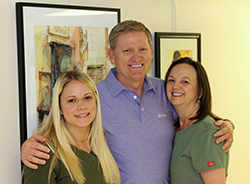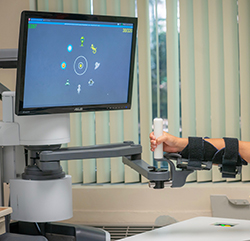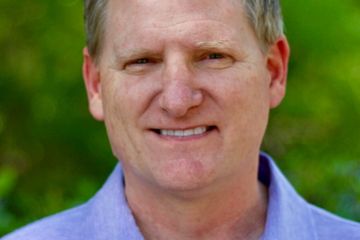Waking up with a hangover the morning after a night of drinking is pretty normal.
Waking up with a hangover the morning after a quiet evening at home is not.
For Chuck Urban, 51, he experienced this unsettling sensation when he woke up the morning of August 22, 2017.
“I felt like I had a hangover, believe it or not — but I didn’t have a drink the night before. It was dragging me down, mentally and physically,” recounted Chuck.
Despite being nauseous and having a headache for no apparent reason, Chuck got out of bed to help his boys, ages 10 and 12, get ready for school just like he would on any other weekday.
While he tried to push through his symptoms to complete his morning routine, his symptoms worsened.
“I started slurring my words, not all of them, but every once in a while. I wasn’t speaking right and felt weak in general, specifically on my left side,” he said. “It was scary.”
In efforts to knock-it-off and refresh himself, Chuck decided to take a shower. But when he couldn’t pick his leg up, he knew something was wrong. He felt even worse than when he did just a few hours before and confided in his wife, Katy, about his symptoms.
“Luckily for me, Katy’s smart and whisked me off to the hospital,” Chuck said. “She saved me from myself, as usual.” They got in the car and headed to Tallahassee Memorial HealthCare (TMH), home to the region’s only Comprehensive Stroke Center, where expert physicians and nurses are specially trained in emergent neurological care.
When they arrived, Chuck was rushed for a CT scan and Siddharth Sehgal, MD, neurologist, provided a rapid diagnosis. What felt like a hangover was actually the neurological deficit from an ischemic stroke, a literal “brain attack.”
“An ischemic stroke is a decrease of blood circulation leading to the brain. It occurs when a blood vessel carrying blood to the brain gets blocked,” said Dr. Sehgal. “As a result, a part of the brain does not get the blood supply, leading to brain cells dying. Each minute after a stroke the brain loses 1.9 million neurons.”
When a stroke happens, saving time means saving brain. Significant advancements have been made in the field of stroke treatment in recent years; however, these treatments are most effective in the first few minutes to hours after a stroke.
Calling 911 and getting medical attention immediately has been proven to improve access to treatments and minimize brain injury from the stroke. Stroke treatment options include tPA, the “clot-busting” medicine, and mechanical thrombectomy, a minimally invasive procedure that removes blood clots without opening the skull.
While Chuck arrived at the hospital outside the treatment window to receive tPA or mechanical thrombectomy, he spent the next two days in acute care and then began intensive rehabilitation at the Tallahassee Memorial Rehabilitation Center (TMRC).
“Regaining motor, sensory, communication and cognitive function after a stroke takes time,” said Dr. Sehgal. “Rehabilitation should start early.”
At TMRC, teams of physical, occupational and speech therapists strive to help patients get the most out of life by providing evidence-based therapies to treat many conditions across the continuum. TRMC also provides specialty inpatient services, including 24-hour nursing care, nutritional monitoring and clinical expertise from full-time physicians, offering medical diagnoses and follow-ups throughout a patients’ stay.
When Chuck was admitted into inpatient rehabilitation, he did not have any functional-use of his left arm – he could barely shrug his left shoulder – and had a difficult time dealing with his lack of independence. “When I was told I would need to spend two weeks there I was shocked and disappointed at first,” said Chuck. “But I lived there and I got the help I needed right away, which was key to my recovery, honestly.”
Chuck’s outlook on rehabilitation shifted with each day as his team of therapists – Steven Horowitz, MPH, OTR/L; Jim Tebo, PT; Lorri Crawford, MS, CCC-SLP; Lauren Pelham, PT; and Sue Bodziak, MOT, OTR/L – gave him the encouragement needed to make significant strides in his stroke recovery. Together, they created a unique treatment plan designed specifically for his rehabilitation, helped him to achieve his goals and made a lasting impression on his heart.
 "As a therapist, you always want your patients to get better and return to an active life. In occupational therapy, we work on the everyday things that most people take for granted, like getting dressed, bathing, standing, walking, and using their extremities for putting on their clothes, brushing their teeth, and eating," expressed Steven. "Chuck's main focus was on recovery of his left arm and we worked seven days a week on that personal goal. It was exciting to work with someone who is dedicated to getting better. We used a wide array of techniques for neuromuscular facilitation including quick stretch, tapping and vibration. He never complained about hard work and sometimes had to be slowed down so his rest periods would be shorter and he could accomplish more during a treatment session."
"As a therapist, you always want your patients to get better and return to an active life. In occupational therapy, we work on the everyday things that most people take for granted, like getting dressed, bathing, standing, walking, and using their extremities for putting on their clothes, brushing their teeth, and eating," expressed Steven. "Chuck's main focus was on recovery of his left arm and we worked seven days a week on that personal goal. It was exciting to work with someone who is dedicated to getting better. We used a wide array of techniques for neuromuscular facilitation including quick stretch, tapping and vibration. He never complained about hard work and sometimes had to be slowed down so his rest periods would be shorter and he could accomplish more during a treatment session."
Chuck jokes that he isn’t the person to give advice to new patients at TMRC, as he was a little discouraged at the onset of his inpatient rehabilitation, however he encourages others working through their injuries to fight hard and be fierce. “The harder I worked at rehab, the more results I saw. Attack it like it’s your job,” he said.
“I worked with Chuck for a short while for lingual strengthening to improve his speech intelligibility,” shared Lorri. “He performed exercises with neuromuscular electrical stimulation and after about four sessions, he and Katy reported that his speech intelligibility was about 95 percent normal. Chuck was motivated and always put forth his best effort – he definitely ‘attacked his new job’ during speech therapy.”
Throughout Chuck’s care, he’s demonstrated incredible perseverance and strength, both emotionally and physically, largely in part to the dedicated support of his team of therapists.
“Chuck is a dedicated patient and all around nice guy,” said Sheree Porter, Director of Therapy Services. “He lives his life after stroke by consistently demonstrating the ABC’s of Success – He maintains a positive Attitude (A), Believes (B) he can make a positive change, and Commits (C) himself to the work required toward recovery.”
Nine months after his graduation from inpatient rehabilitation, Chuck’s journey continues at the Tallahassee Memorial Neuro Rehabilitation Clinic, which resides within TMRC. Twice a week he receives intensive outpatient physical and occupational therapy with two of his therapists from the very beginning.
“Chuck’s story is one of quiet determination, faith, teamwork and a positive attitude. Throughout his rehabilitation, he smiled when he met a goal and then quickly and resolutely stepped up to the next challenge,” said Lauren. “I have worked with many stroke patients in the past and the recovery process can be quite timely, but with Chuck I was fortunate enough to see gains in a short amount of time. This has a lot to do with his dedication and willingness to push through some of the hardest times,” added Sue. “Chuck had a separation in his shoulder due to the stroke and no movement when he first arrived at therapy. After only a few sessions, he was regaining movement in no time due to his dedication to therapy and home exercise. Chuck’s shoulder separation caused severe pain, but he always worked through it stating ‘no pain, no gain.’ He is a true representation of the commitment it takes to regain the deficits that are lost from a stroke. I have great respect and feel blessed to be a part of Chuck’s journey.”
It was evident that from inpatient to outpatient rehabilitation, his progress was their passion. The Urbans knew they wanted to show a small token of their appreciation.
“Chuck and Katy are extremely generous – they donated vouchers for approximately forty pairs of very nice running shoes for TMRC therapy teams. Colleagues simply presented their vouchers at a local retailer and were able to choose any shoe in the store. It was amazing,” said Sheree. “Chuck told us that he noticed we are on our feet a lot and that being comfortable was important.”
But their generosity didn’t stop there.
 Last October, Chuck participated in a trial of a new robotic arm system during occupational therapy. This technology, designed to enhance neurological therapy for stroke care, wowed Chuck and patients alike with immediate results after just one session.
Last October, Chuck participated in a trial of a new robotic arm system during occupational therapy. This technology, designed to enhance neurological therapy for stroke care, wowed Chuck and patients alike with immediate results after just one session.
“My therapists thought it would be helpful to their patients,” said Chuck. “I was in a position to help with the recovery process of other patients’, not just stroke survivors, but anyone who needed the device to assist in their recovery.”
The Urbans wanted to show more of their sincere appreciation for his second chance at life.
“The team at TMRC cannot begin to comprehend what a difference they make in their patients’ lives, at least not the impact they’ve made on my recovery. The work they do on a daily basis is life-changing,” recounted Chuck as he looks back on his experience at TMRC.
With the help of the TMH Foundation and other generous donors, the Urbans gifted a sizeable donation for the acquisition of a robotic arm system – making TMRC the only rehabilitation center in North Florida to offer the use of robotics, the most advanced technology in rehabilitation for neurological diagnoses.
“Chuck’s work ethic is only surpassed by his generosity,” said Sheree. “He’s an integral force in supporting the acquisition of cutting-edge technology that will benefit many patients for years to come.”

